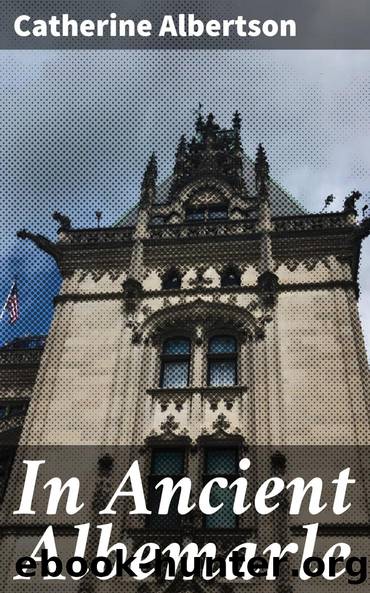In Ancient Albemarle by Catherine Albertson

Author:Catherine Albertson [Albertson, Catherine]
Language: eng
Format: epub
ISBN: 9780649126750
Google: PibZswEACAAJ
Publisher: Trieste Publishing Pty Limited
Published: 2017-07-28T00:56:02+00:00
* * *
CHAPTER XII
Table of Contents
GENERAL ISAAC GREGORY, A REVOLUTIONARY OFFICER OF PASQUOTANK-CAMDEN
During the War of the Revolution, the Albemarle Region, though threatened with invasion time and again by the British, seldom heard the tread of the enemy's army, or felt the shock of battle. For this immunity from the destruction of life and property, such as the citizens whose homes lay in the path of Cornwallis and Tarleton suffered, this section of North Carolina is largely indebted to General Isaac Gregory, one of the bravest officers who ever drew sword in defense of his native home and country.
Both Pasquotank and Camden claim this gallant officer for their son, and both have a right to that claim; for the two counties were one until 1777. In that year a petition was presented to the General Assembly by Joseph Jones, of Pasquotank, from citizens living in what is now Camden County, that the portion of Pasquotank lying on the northeast bank of the river should be formed into a separate county, and have a court-house of its own, in order to do away with the inconvenience the people of that section suffered in having to cross the river to attend court, military drills and other public gatherings. The General Assembly passed an act providing for the erection of a new county, and this county was named for Charles Pratt, Earl of Camden, a member of Parliament and Chancellor, who in the stormy days of 1765 worked for the repeal of the hated Stamp Act, and justice to the Colonies.
Before the long and bloody days of the Revolution proved his worth as a soldier, Isaac Gregory had won a prominent place in the public affairs of his county. His name first occurs in the Colonial Records in 1773, when he was elected sheriff of Pasquotank. In the same year he was appointed one of the trustees of St. Martin's Chapel in Indian Town, Currituck County, a settlement whose citizens were many of them to become honored in the civil and military history of our State.
Ever since the passing of the Stamp Act in 1765, low mutterings of the storm that was soon to sweep over the country some ten years later had disturbed the peace of the Thirteen Colonies; and events in North Carolina showed that this colony was standing shoulder to shoulder with her American sisters in their endeavor to obtain justice from England.
In 1774, John Harvey's trumpet call to the people of North Carolina to circumvent Governor Martin's attempt to deprive them of representation in the Continental Congress at Philadelphia, had resulted in the convention at New Bern, the first meeting in America at which the representatives of a colony as a whole had ever gathered in direct defiance of orders from a Royal Governor.
The next year, in April, Harvey again called a convention of the people to meet in New Bern. Again Governor Martin was defied; again, the North Carolinians, taking matters into their own hands, elected delegates to Philadelphia, and before adjourning, added Carolina's name to the association of Colonies.
Download
This site does not store any files on its server. We only index and link to content provided by other sites. Please contact the content providers to delete copyright contents if any and email us, we'll remove relevant links or contents immediately.
| United States |
In Cold Blood by Truman Capote(2709)
Steve Jobs by Walter Isaacson(2466)
All the President's Men by Carl Bernstein & Bob Woodward(1978)
Lonely Planet New York City by Lonely Planet(1863)
The Murder of Marilyn Monroe by Jay Margolis(1757)
The Room Where It Happened by John Bolton;(1735)
The Poisoner's Handbook by Deborah Blum(1682)
And the Band Played On by Randy Shilts(1640)
Lincoln by David Herbert Donald(1627)
The Innovators by Walter Isaacson(1618)
A Colony in a Nation by Chris Hayes(1540)
The Innovators: How a Group of Hackers, Geniuses, and Geeks Created the Digital Revolution by Walter Isaacson(1526)
Under the Banner of Heaven: A Story of Violent Faith by Jon Krakauer(1431)
The Unsettlers by Mark Sundeen(1353)
Amelia Earhart by Doris L. Rich(1352)
Birdmen by Lawrence Goldstone(1352)
Decision Points by George W. Bush(1268)
Dirt by Bill Buford(1258)
Zeitoun by Dave Eggers(1239)
